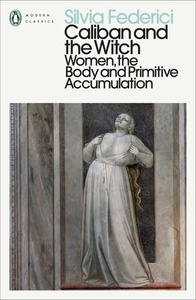Take a photo of a barcode or cover
informative
reflective
medium-paced
Caliban and The Witch posits that the witch hunts that took place in Europe (and the American colonies) during the Early Modern period should be read as the climax of the societal misogyny that exploded alongside of, and as the result of, the transition from feudalism to market capitalism. The author, a socialist/marxist feminist, draws on marxist philosophical analysis, and some historical data, to make her case, and weaves in the colonisation of the Americas to draw parallels between the exploitation of the emergent working class, that of enslaved African and American natives, and the degradation women's societal status underwent as Europe exited the Middle Ages – hence the reference to Shakespeare's play and characters.
This is an interesting thesis, the core idea of which I was already familiar with, and also agree with to a certain extent... But! It was not written by a historian, and it painfully showed. There are massive issues with the way the author backs up some of her claims – in fact some of her bolder claims aren't backed up by sourced data at all – and misconstrues the available data on the period of history her thesis covers. It really didn't help that I read Ronald Hutton's The Witch last month: that book is all about history, written by a very measured but thorough academic. It is also a more recent publication, and thus relies on more recent historical research and analysis. For instance, one should keep in mind that no, the body count for the European witch trials does not go into the several hundreds of thousands. It was still way too high, mind you, given the horrific suffering and irredeemably tragic loss of life the witch trials entailed, but inflating the numbers and barreling through on a current of factual inaccuracy doesn't earn my praise or respect either.
The author, as far as I'm concerned, arranged a lot of the data to fit her hypothesis. Let me repeat here that I think there are nuggets of truth to it: there was, in fact, a broad and steady erosion of women's social status and rights during the Early Modern period – heretofore misguidedly named the "Renaissance" – and I'm on board to draw parallels between different axes of oppression... as long as temporal and geographic context is taken into account to allow for a more nuanced understanding of the broader "patterns". I'm very critical of capitalism as well and agree major historical shifts often hide ills that we're only now able to perceive through scientific enquiry that welcomes different points of view – and not just, you know, the biased perspective of one specific demographic, ahem. But Ms Federici's treatise runs on a mode of enquiry that isn't scientific enough in my opinion; like I said, the available data was arranged too purposefully to prove or support a pre-embraced hypothesis, and that just doesn't sit right with me.
Additionally, I was very confused by the following: was the author actually arguing patriarchy wasn't a thing before the advent of capitalism?! I'm still not entirely sure about this because the phrasing was a bit vague in places – the organisation of the thesis' main sections or arguments could've also used some tidying or streamlining, if I'm perfectly honest. Again, some things did in fact become worse for women as Europe exited the Middle Ages but... history is complex, a hodgepodge of crossing threads, reinforcing or colliding factors, and the simple fact is patriarchy/androcracy didn't magically emerge out of the void in the 15th-16th centuries, like hello?! I don't subscribe to the idea that patriarchy is the default state of human society by any means, but it's been bopping about for longer than five to six hundred years, and European capitalists aren't solely responsible for its emergence! Due credit wasn't even given to the ancient Greco-Roman world or the Christian Church... Though, once again, I'm not entirely sure that's what Ms Federici was ultimately asserting, quite, either.
That's why Caliban and The Witch doesn't get anything higher than a 6/10 from me. It was an interesting read overall, but also a very disappointing and frustrating one.
NB: I'm pretty sure you can find comments, written by actual historians, that go through the book's many historical inaccuracies, if you're interested – on Reddit at least.
This is an interesting thesis, the core idea of which I was already familiar with, and also agree with to a certain extent... But! It was not written by a historian, and it painfully showed. There are massive issues with the way the author backs up some of her claims – in fact some of her bolder claims aren't backed up by sourced data at all – and misconstrues the available data on the period of history her thesis covers. It really didn't help that I read Ronald Hutton's The Witch last month: that book is all about history, written by a very measured but thorough academic. It is also a more recent publication, and thus relies on more recent historical research and analysis. For instance, one should keep in mind that no, the body count for the European witch trials does not go into the several hundreds of thousands. It was still way too high, mind you, given the horrific suffering and irredeemably tragic loss of life the witch trials entailed, but inflating the numbers and barreling through on a current of factual inaccuracy doesn't earn my praise or respect either.
The author, as far as I'm concerned, arranged a lot of the data to fit her hypothesis. Let me repeat here that I think there are nuggets of truth to it: there was, in fact, a broad and steady erosion of women's social status and rights during the Early Modern period – heretofore misguidedly named the "Renaissance" – and I'm on board to draw parallels between different axes of oppression... as long as temporal and geographic context is taken into account to allow for a more nuanced understanding of the broader "patterns". I'm very critical of capitalism as well and agree major historical shifts often hide ills that we're only now able to perceive through scientific enquiry that welcomes different points of view – and not just, you know, the biased perspective of one specific demographic, ahem. But Ms Federici's treatise runs on a mode of enquiry that isn't scientific enough in my opinion; like I said, the available data was arranged too purposefully to prove or support a pre-embraced hypothesis, and that just doesn't sit right with me.
Additionally, I was very confused by the following: was the author actually arguing patriarchy wasn't a thing before the advent of capitalism?! I'm still not entirely sure about this because the phrasing was a bit vague in places – the organisation of the thesis' main sections or arguments could've also used some tidying or streamlining, if I'm perfectly honest. Again, some things did in fact become worse for women as Europe exited the Middle Ages but... history is complex, a hodgepodge of crossing threads, reinforcing or colliding factors, and the simple fact is patriarchy/androcracy didn't magically emerge out of the void in the 15th-16th centuries, like hello?! I don't subscribe to the idea that patriarchy is the default state of human society by any means, but it's been bopping about for longer than five to six hundred years, and European capitalists aren't solely responsible for its emergence! Due credit wasn't even given to the ancient Greco-Roman world or the Christian Church... Though, once again, I'm not entirely sure that's what Ms Federici was ultimately asserting, quite, either.
That's why Caliban and The Witch doesn't get anything higher than a 6/10 from me. It was an interesting read overall, but also a very disappointing and frustrating one.
NB: I'm pretty sure you can find comments, written by actual historians, that go through the book's many historical inaccuracies, if you're interested – on Reddit at least.
challenging
dark
informative
reflective
sad
tense
slow-paced
Me parece una lectura superinteresante ya que retroceder en la historia del feminismo hasta antes del capitalismo deja ver cosas de las que se ha hablado poco. Además, no deja de lado temas como la esclavitud y el colonialismo y los intersecciona con el feminismo de la época. Si le tuviera que poner alguna pega sería que me parece que se tocan tantos temas que puede resultar una lectura abrumadora y hay temas en los que se hace mucho hincapié, mientras que por otros parece que solo se pasa por encima.
challenging
dark
emotional
informative
reflective
sad
tense
slow-paced
Going to keep reading, but want it off my page
Incredibly well researched and well written, but very dry and hard to get through. It's fairly academic.
Minor: Misogyny, Rape, Sexism, Sexual assault, Sexual violence, Slavery, Violence, Religious bigotry, Colonisation
Interesting, but definitely not a beach read! Bring your pen and notebook for this one, because you'll need to take notes. I will use it for reference again, I'm sure.
informative
medium-paced
A must read, very clear, and extremely important. Federici eloquently explains and exposes her thoughts and takes on marxism, women and the reasons behind witch hunting among other forms of control, capitalism, colonization, and much more.
I can't believe I didn't read this book earlier in my life.
All I want to do now is gift it to every person I know.
I can't believe I didn't read this book earlier in my life.
All I want to do now is gift it to every person I know.
informative
reflective
medium-paced








